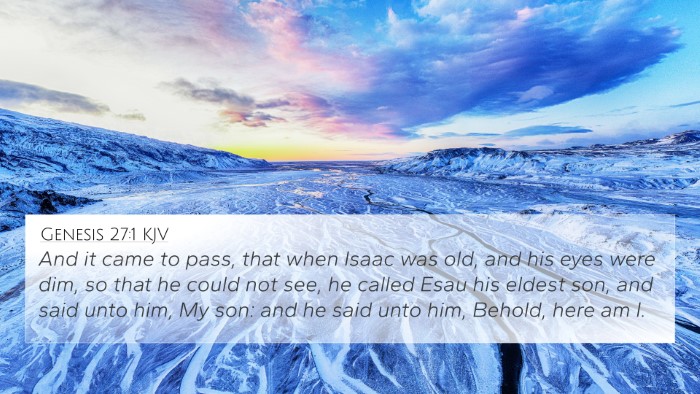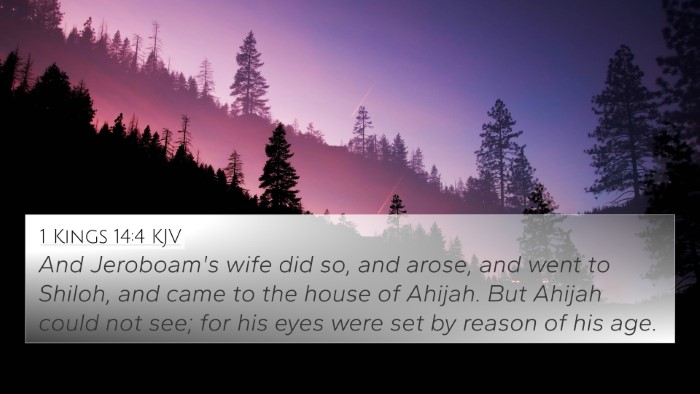Understanding 1 Samuel 4:15
1 Samuel 4:15 states: "Now Eli was ninety-eight years old, and his eyes were dim so that he could not see." This verse sets the stage for a significant moment in the Biblical narrative, encapsulating themes of judgment, leadership, and the decline of Israel's spiritual condition. To grasp the depth of this verse, we can turn to various commentaries that provide insights into Eli's condition and its implications for Israel.
Analysis from Public Domain Commentaries
The commentaries of Matthew Henry, Albert Barnes, and Adam Clarke offer rich interpretations that illuminate the meaning behind this scripture.
Insights from Matthew Henry
- Eli's Age: Matthew Henry emphasizes Eli's old age, noting that his life reflects the waning spiritual health of Israel. His dimmed vision symbolizes the spiritual blindness that afflicted not just Eli, but the entire nation, which had turned away from God's guidance.
- Leadership Failures: Henry points out that Eli's failure as a leader led to moral decay among the people. His inability to see was not just physical but metaphorical, representing a failure to discern the spiritual and ethical decline of the nation.
Insights from Albert Barnes
- Symbolism of Blindness: Barnes draws attention to the symbolism inherent in Eli's blindness. It is a severe warning to leaders about the importance of spiritual vigilance and the consequences of neglecting personal and communal morality.
- Judgement of God: Barnes describes Eli's condition as a sign of God's judgment upon him for his prior inactions regarding the sins of his sons, Hophni and Phinehas. This sends a clear message about divine justice and accountability.
Insights from Adam Clarke
- Cultural Context: Adam Clarke provides a cultural context, noting how Eli's diminishing strength correlates with the overall decline of Israel during the time of the judges. His inability to see suggests a deeper, spiritual blindness affecting the nation.
- Importance of Discernment: Clarke emphasizes the importance of spiritual discernment for leaders, stressing that the faithfulness of a leader directly impacts the community's relationship with God.
Bible Verse Cross-References
1 Samuel 4:15 has multiple connections with other scriptures that highlight similar themes of leadership, vision, and God's judgment. Here are some noteworthy cross-references:
- 1 Samuel 2:12-17: This passage discusses the wickedness of Eli's sons and sets the stage for Eli's eventual downfall.
- Proverbs 29:18: "Where there is no vision, the people perish" — echoing the consequences of spiritual blindness.
- 2 Samuel 5:6-8: Reflects on the importance of strong leadership in Israel, comparable to Eli's leadership failures.
- Jeremiah 5:21: Speaks of a people with eyes but who do not see, paralleling Eli’s condition.
- Matthew 15:14: Jesus refers to blind leaders who lead the blind, using a similar metaphor of blindness in leadership.
- Revelation 3:17: This verse warns about self-deception regarding spiritual states, aligning with Eli’s failure to see the truth of his son’s actions.
- 1 Corinthians 9:27: Paul speaks of keeping his body under control, indicating the need for leaders to remain vigilant, much like what Eli failed to do.
Thematic Connections Between Bible Verses
This verse also engages in an inter-Biblical dialogue regarding themes such as divine judgment, the role of leaders, and spiritual blindness. These connections can enhance understanding through comparative Bible verse analysis.
Cross-Referencing Biblical Texts
Utilizing tools for Bible cross-referencing helps illuminate the connections between Eli's blindness and broader biblical themes. Observing these connections deepens one's understanding of how scripture instructs on proper leadership and moral accountability.
Conclusion
In summary, 1 Samuel 4:15 serves as a poignant reminder of the spiritual state of Israel under Eli's leadership. Through the insights from various commentaries and the thematic connections revealed through scripture, readers can grasp the serious implications of spiritual blindness and the responsibilities of those in leadership. Engaging with this verse invites further exploration of other related Bible verses that support and enrich its interpretation.
This exploration into 1 Samuel 4:15 exemplifies how cross-referencing Bible verses can provide deeper insights into scriptural themes. As we study the Bible, utilizing a cross-reference Bible study approach enhances our understanding of the interconnectedness of Biblical texts.






